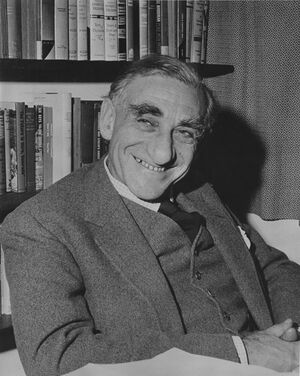Leonard Schapiro
(academic, propagandist) | |
|---|---|
 | |
| Born | 22 April 1908 Glasgow, UK |
| Died | 2 November 1983 (Age 75) London, UK |
| Alma mater | University College London |
| Spouse | • Isabel de Madariaga • Roma Thewes |
| Interests | • USSR • Information Research Department • anti-communism • Robert Conquest |
"Inner-circle" British Cold War propagandist. | |
Leonard Bertram Naman Schapiro was a British propaganda agent, academic and scholar of Russian politics. He taught for many years at the London School of Economics, where he was Professor of Political Science with Special Reference to Russian Studies.
Schapiro is an important figure in the study of Cold War propaganda due to his collaboration with both the CIA, and the Information Research Department (IRD), a secret branch of the UK Foreign Office which dealt with weaponized disinformation, pro-colonial, and anti-communist propaganda.[1][2][3]
Historians Paul Lashmar and James Oliver have described Schapiro as a member of the "inner-circle" of the IRD's propaganda publication activities.[4] Much of his work was secretly funded and promoted by the IRD,[5] in return for his collaboration as a Cold War propaganda agent.[6][7][8] After working with the IRD, Schapiro then continuied publishing Cold War propaganda through the use of CIA front organisations[9]
Schapiro was of Russian-Jewish background; his father, Max, was the University of Glasgow-educated son of a wealthy businessman who owned a timber mill and forests outside Riga, Latvia; his mother, Leah, was a Polish rabbi's daughter.[10] Born in Glasgow, he was taken to Russia and spent some of his childhood in Riga (his father having taken over the family timber business) and St. Petersburg, when his father took a position in railway administration.[11]
He returned to Britain with his parents in 1920 and completed his education in London, at St Paul's School, then at University College, London. He was called to the Bar from Gray's Inn in 1932, returning to the law after the Second World War until 1955. His fluency in Russian, German, French and Italian led him to work for the B.B.C.'s Monitoring Service in 1940; in 1942 he joined the General Staff at the War Office, and from 1945-6 served in the Intelligence Division of the German Control Command, reaching the rank of Lieutenant-Colonel.[12][13]
Schapiro's most famous book was The Communist Party of the Soviet Union, first published in 1960 with a revised and expanded edition in 1970. He was chairman of the Institute for the Study of Conflict in 1970. He wrote many books about communism, particularly in the context of the Soviet Union. Shapiro's traditional liberalism alienated him from those scholars more sympathetic to the goals, if not the means of Soviet socialism, such as E. H. Carr.
In the historiography of the USSR, Leonard Schapiro is representative of the liberal current alongside for example Robert Conquest or Martin Malia. He also influenced Boris Souvarine and Merle Fainsod. In 1972, Leonard Schapiro wrote a book on totalitarianism, in which he expressed the fact that he still believed in the relevance of the concept, despite the criticisms it received. Nevertheless, he recognized, following the debate of the 1960s, that there was a distance between the conceptual model and the actual practices of communist regimes. On the other hand, he was opposed to the "specialized jargon of sociological analysis", which he criticized for blurring the whole understanding of Soviet society.[14]
Schapiro also translated into English the novel Spring Torrents by Ivan Turgenev. After his death, some of his scattered articles were collected in the volume Russian Studies (1987).
He had married firstly, in 1943, Isabel de Madariaga, an historian of eighteenth century Russia;[15] following their 1976 divorce, he married editor Roma Thewes.[16]
Books
- The Origins of the Communist Autocracy, G. Bell and Sons, 1955.
- The Communist Party of the Soviet Union, Random House Publishers, 1970. ISBN 9780394470146
- Totalitarianism: Key Concepts in Political Science, The University of Michigan, 1972.
- The Russian Revolutions of 1917: The Origins of Modern Communism, Basic Books, Inc., Publishers, 1984.
References
- ↑ Defty, Andrew (2005). Britain, America and Anti-Communist Propaganda 1945-1953: The Information Research Department. eBook version: Routledge. p. 172.
- ↑ Defty, Andrew (2005). Britain, America and Anti-Communist Propaganda 1945-1953: The Information Research Department. E-book version: Routledge. p. 259.
- ↑ Jenks, John (2006). British Propaganda and News Media in the Cold War. Edinburgh: Edinburgh University Press. p. 141.
- ↑ Lashmar, Paul; Oliver, James (1988). Britain’s Secret Propaganda War 1948-1977. Phoenix Mill: Sutton Publishing. pp. 123–124.
- ↑ Jenks, John (2006). British Propaganda and News Media in the Cold War. Edinburgh: Edinburgh University Press. p. 70.
- ↑ Lashmar, Paul; Oliver, James (1988). Britain’s Secret Propaganda War 1948-1977. Phoenix Mill: Sutton Publishing. p. 37.
- ↑ Lashmar, Paul; Oliver, James (1988). Britain’s Secret Propaganda War 1948-1977. Phoenix Mill: Sutton Publishing. p. 122.
- ↑ Defty, Andrew (2005). Britain, America and Anti-Communist Propaganda 1945-1953: The Information Research Department. eBook version: Routledge. p. 172.
- ↑ Lashmar, Paul (1988). Britain’s Secret Propaganda War 1948-1977. Britain’s Secret Propaganda War 1948-1977. Mill: Sutton Publishing. p. 64.
- ↑ Leonard Bertram Schapiro (1908-1983): An Intellectual Memoir, Peter Reddaway, Woodrow Wilson International Center for Scholars, 1984, p. 1
- ↑ Leonard Bertram Schapiro (1908-1983): An Intellectual Memoir, Peter Reddaway, Woodrow Wilson International Center for Scholars, 1984, pp. 1-2
- ↑ Leonard Bertram Schapiro (1908-1983): An Intellectual Memoir, Peter Reddaway, Woodrow Wilson International Center for Scholars, 1984, pp. 3-4
- ↑ http://www.oxforddnb.com/view/10.1093/ref:odnb/9780198614128.001.0001/odnb-9780198614128-e-31658
- ↑ Ellen Dahrendorf (éd.), Russian Studies, Viking, New York, 1986, p. 21
- ↑ https://www.theguardian.com/books/2014/jul/15/isabel-de-madariaga
- ↑ Leonard Bertram Schapiro (1908-1983): An Intellectual Memoir, Peter Reddaway, Woodrow Wilson International Center for Scholars, 1984, p. 30